Mitsubishi ASX vs Honda HR-V – Differences & prices compared
Compare performance, boot space, consumption and price in one view.
Find out now: which car is the better choice for you – Mitsubishi ASX or Honda HR-V?
The Mitsubishi ASX (SUV) comes with a Petrol, Petrol MHEV or Full Hybrid engine and Manuel or Automatic transmission. In comparison, the Honda HR-V (SUV) features a Full Hybrid engine with Automatic transmission.
When it comes to boot capacity, the Mitsubishi ASX offers 484 L, while the Honda HR-V provides 319 L – depending on how much space you need. If you’re looking for more power, decide whether the 158 HP of the Mitsubishi ASX or the 131 HP of the Honda HR-V suits your needs better.
In terms of consumption, the values are 4.60 L per 100 km for the Mitsubishi ASX, and 5.40 L for the Honda HR-V.
Price-wise, the Mitsubishi ASX starts at 20600 £, while the Honda HR-V is available from 29700 £. Compare all the details and find out which model fits your lifestyle best!
In the compact SUV segment, the Honda HR-V and Mitsubishi ASX both bring unique strengths to the table. The HR-V shines with its sleek design and impressive fuel efficiency, making it a standout choice for urban drivers who value style and economy. On the other hand, the ASX offers robust performance and a user-friendly infotainment system, appealing to those who prioritize practicality and technological features in their daily commute.
Mitsubishi ASX
The Mitsubishi ASX presents itself as a compact crossover that combines practicality with style. Its sleek design and versatile interior make it an appealing choice for both urban and rural settings. With a focus on providing a comfortable driving experience, the ASX also offers a range of modern features that enhance connectivity and safety.
details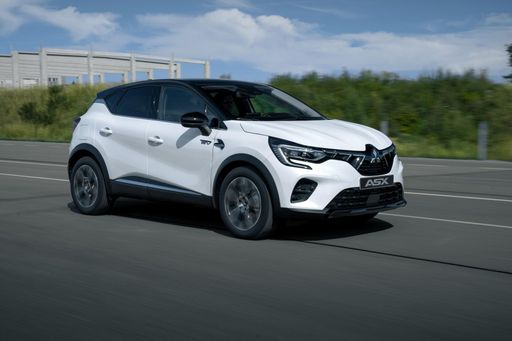 @ Mitsubishi
@ Mitsubishi
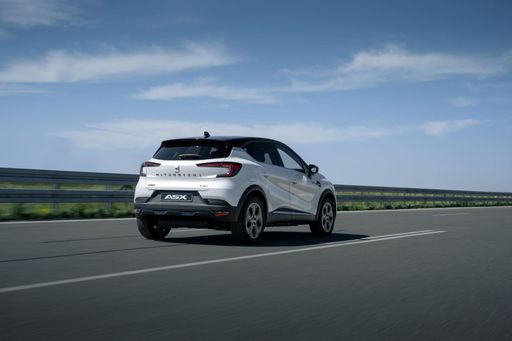 @ Mitsubishi
@ Mitsubishi
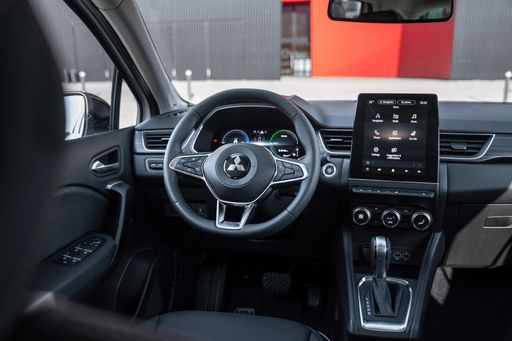 @ Mitsubishi
@ Mitsubishi
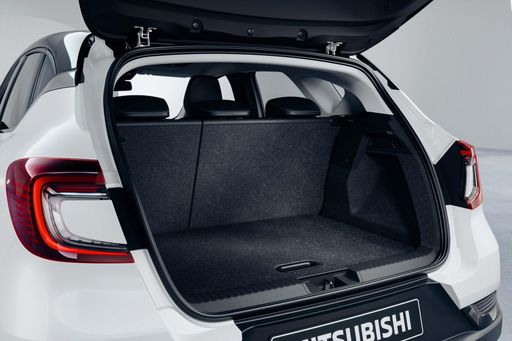 @ Mitsubishi
@ Mitsubishi
Honda HR-V
The Honda HR-V impresses with its sleek design, combining a dynamic exterior with a comfortable and spacious interior. This versatile compact SUV offers a smooth and responsive driving experience, making it ideal for both city commuting and weekend adventures. Equipped with advanced safety features and technology, the HR-V ensures a connected and secure journey for all passengers.
details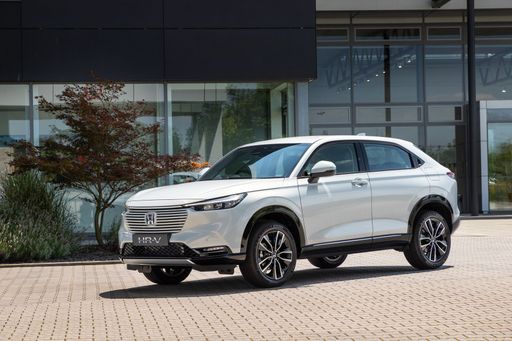 @ hondanews.eu
@ hondanews.eu
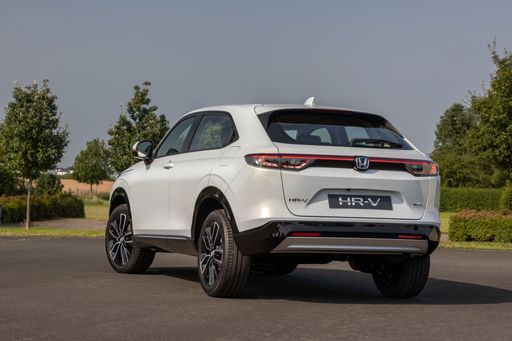 @ hondanews.eu
@ hondanews.eu
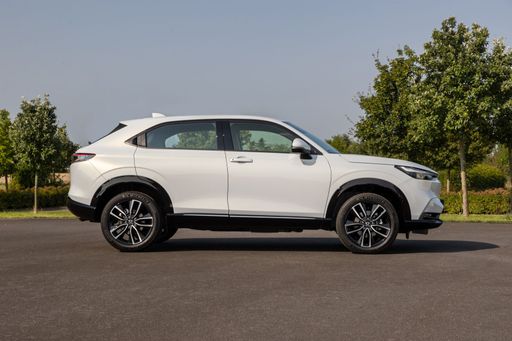 @ hondanews.eu
@ hondanews.eu
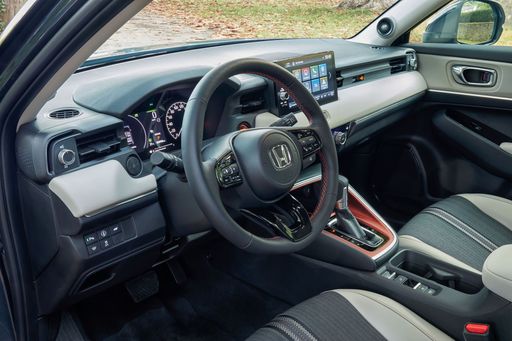 @ hondanews.eu
@ hondanews.eu
Comparing Compact SUVs: Honda HR-V vs. Mitsubishi ASX
In the bustling world of compact SUVs, the Honda HR-V and Mitsubishi ASX have emerged as popular choices for urban commuters and adventure seekers alike. Both vehicles offer a blend of style, efficiency, and practicality, but which one comes out on top? Let's dive into the technical aspects and innovations that set these models apart.
Engine and Performance
The Honda HR-V for the 2022 model year comes equipped with a full hybrid engine that delivers a robust 130 horsepower and 96 kW. It's equipped with a Continuously Variable Transmission (CVT) that focuses on smooth and efficient driving. This full hybrid configuration is known for its impressive fuel efficiency, consuming just 5.4 L/100 km, while emitting 122 g/km of CO2.
On the other hand, the Mitsubishi ASX, a 2024 model, offers diverse engine options, including a 158 HP petrol engine linked with a Dual-Clutch Automatic transmission for those seeking a more dynamic driving experience. Its consumption ranges from 4.7 to 6 L/100 km depending on the engine variant, with a CO2 emission as low as 107 g/km, making it a viable eco-friendly choice. The ASX also provides an intriguing Full Hybrid option.
Design and Dimensions
In terms of design, both SUVs feature a sporty appearance with distinct accents. The HR-V stretches at 4340 mm in length and stands 1582 mm tall. Inside, it comfortably seats five passengers with a trunk capacity of up to 335 liters. The curb weight of the HR-V stands at 1452 kg, giving it a sturdy, substantial feel on the road.
The ASX is slightly more compact with a length of 4239 mm and a height of 1575 mm, offering a practical but agile profile. The trunk capacity is generous, starting at 348 liters and can go up to 484 liters depending on configurations. The curb weight varies with its engine configuration, ranging from 1296 kg to 1501 kg.
Technological Innovations
Both SUVs come equipped with the latest technological advancements to enhance the driving experience. The HR-V's hybrid system is a highlight, as it automatically switches between electric, hybrid, or engine drive modes, optimizing efficiency on every journey. The cabin is equipped with the latest infotainment system and safety features, providing a sophisticated yet user-friendly environment.
The ASX continues to impress with its array of modern features, including its MHEV (Mild Hybrid Electric Vehicle) capabilities, aimed at improving fuel economy without compromising performance. The ASX showcases Mitsubishi's advanced technology suite with options for different drivetrains, integrating seamlessly with its in-cabin tech to ensure a comfortable ride.
Concluding Remarks: Making the Right Choice
Choosing between the Honda HR-V and the Mitsubishi ASX boils down to personal preferences and driving needs. If you prioritize hybrid technology and excellent fuel efficiency, the HR-V stands out as a remarkable choice. However, if a diverse range of engine options and advanced MHEV technology catch your interest, the ASX might just be your perfect fit.
Both vehicles exhibit exceptional build quality and performance, ensuring they are worthy contenders in the compact SUV arena. Whether you lean towards the refined elegance of Honda or the versatile performance of Mitsubishi, you'll find both models deliver outstanding value and innovation.

|

|
|
|
|
Costs and Consumption |
|
|---|---|
|
Price
20600 - 32000 £
|
Price
29700 - 35400 £
|
|
Consumption L/100km
4.6 - 6 L
|
Consumption L/100km
5.40 L
|
|
Consumption kWh/100km
-
|
Consumption kWh/100km
-
|
|
Electric Range
-
|
Electric Range
-
|
|
Battery Capacity
0.60 kWh
|
Battery Capacity
-
|
|
co2
105 - 135 g/km
|
co2
122 g/km
|
|
Fuel tank capacity
48 L
|
Fuel tank capacity
40 L
|
Dimensions and Body |
|
|---|---|
|
Body Type
SUV
|
Body Type
SUV
|
|
Seats
5
|
Seats
5
|
|
Doors
5
|
Doors
5
|
|
Curb weight
1296 - 1501 kg
|
Curb weight
1452 kg
|
|
Trunk capacity
348 - 484 L
|
Trunk capacity
319 L
|
|
Length
4239 mm
|
Length
4355 mm
|
|
Width
1797 mm
|
Width
-
|
|
Height
1575 mm
|
Height
1582 mm
|
|
Payload
399 - 449 kg
|
Payload
418 kg
|
Engine and Performance |
|
|---|---|
|
Engine Type
Petrol, Petrol MHEV, Full Hybrid
|
Engine Type
Full Hybrid
|
|
Transmission
Manuel, Automatic
|
Transmission
Automatic
|
|
Transmission Detail
Schaltgetriebe, Automat. Schaltgetriebe (Doppelkupplung), Automatikgetriebe
|
Transmission Detail
-
|
|
Drive Type
Front-Wheel Drive
|
Drive Type
Front-Wheel Drive
|
|
Power HP
91 - 158 HP
|
Power HP
131 HP
|
|
Acceleration 0-100km/h
8.5 - 14 s
|
Acceleration 0-100km/h
10.6 - 10.8 s
|
|
Max Speed
168 - 180 km/h
|
Max Speed
170 km/h
|
|
Torque
160 - 270 Nm
|
Torque
253 Nm
|
|
Number of Cylinders
3 - 4
|
Number of Cylinders
4
|
|
Power kW
67 - 116 kW
|
Power kW
96 kW
|
|
Engine capacity
999 - 1598 cm3
|
Engine capacity
1498 cm3
|
General |
|
|---|---|
|
Model Year
2024
|
Model Year
2025
|
|
CO2 Efficiency Class
D, C
|
CO2 Efficiency Class
D
|
|
Brand
Mitsubishi
|
Brand
Honda
|
Mitsubishi ASX
The Mitsubishi ASX: A Modern SUV with Advanced Features
The Mitsubishi ASX continues to be a popular choice for SUV enthusiasts, combining sleek design, impressive efficiency, and innovative technology. The 2024 model year introduces an array of improvements, making it a worthy contender in its category. In this article, we will delve into the technical details and innovative aspects of the Mitsubishi ASX, presenting why it stands out in the SUV segment.
Sophisticated Powertrains and Efficiency
Under the bonnet, the Mitsubishi ASX offers a variety of powertrain options, catering to different driving preferences. Customers can choose from petrol engines, mild-hybrid systems, and full-hybrid configurations, balancing power and efficiency effectively.
The performance spectrum ranges from 91 PS to 158 PS, demonstrating the vehicle's versatility. With a fuel consumption of between 4.7 and 6 L/100km, the ASX effectively manages fuel efficiency without compromising on performance. The car's CO2 emissions range from 107 to 135 g/km, placing it within CO2 efficiency classes C and D.
Advanced Transmission Options
The ASX offers a mixture of manual and automatic transmissions to meet diverse driving needs. Its gearbox specifications include a standard manual option and automatic options such as dual-clutch transmissions, providing a seamless driving experience. Depending on the variant, the vehicle can accelerate from 0 to 100 km/h in as little as 8.5 seconds, reaching maximum speeds between 168 and 180 km/h.
Modern Design and Spacious Interior
Externally, the ASX reflects contemporary design aesthetics, with dimensions of 4239 mm in length, 1797 mm in width, and 1575 mm in height. Internally, it accommodates up to five passengers comfortably and offers a respectable boot capacity ranging from 348 to 484 litres. Despite its spaciousness, the SUV maintains an optimal weight between 1296 and 1501 kg, which aids in delivering its intended driving dynamics.
Safety and Technology Innovations
Mitsubishi prioritises safety and technology in the ASX. It is equipped with the latest driver-assistance systems, enhancing safety and convenience. The modern infotainment system integrates smoothly with smartphones, ensuring that connectivity is at the driver's fingertips. Moreover, various trimming levels such as "Intro Edition DCT" and "Top Automatik" allow customers to select features best suited to their lifestyle, from basic utilities to luxury enhancements.
Conclusion: A Balanced SUV Choice
The Mitsubishi ASX stands out as a well-rounded SUV choice for those who prioritise efficiency, reliability, and modern technology. Its array of powertrains, stylish design, and advanced safety features make it an attractive option within its price range of €23,990 to €37,390. The ASX's 2024 model reaffirms Mitsubishi’s commitment to offering innovative yet practical vehicles to the global market.
Honda HR-V
Exploring the Honda HR-V: A Testament to Innovation
The Honda HR-V epitomises the harmonious blend of SUV practicality and hybrid innovation. This remarkable model offers a compelling choice for those seeking a vehicle that is as environmentally conscious as it is versatile. Let's delve into the technical prowess and innovative features that make the HR-V a standout in its class.
Powerful Yet Efficient Hybrid Technology
At the heart of the Honda HR-V is its 1.5 i-MMD e:HEV full-hybrid powertrain. This advanced system delivers a robust 130 PS (96 kW) while maintaining an impressive fuel consumption of just 5.4 L/100km. The HR-V achieves this through its continuously variable transmission (CVT), which optimises efficiency by adjusting seamlessly to driving conditions. The combination results in a smooth yet responsive drive, marking a significant achievement in hybrid technology.
Design and Practicality
The HR-V seamlessly blends elegant design with practical functionality. Measuring 4340 mm in length and 1582 mm in height, it provides ample cabin space while maintaining a compact footprint. Inside, the HR-V comfortably seats five passengers, ensuring a pleasant journey for both driver and passengers. The boot space, ranging from 320 to 335 litres, offers flexibility for various cargo needs.
Performance and Responsive Handling
With a maximum torque of 253 Nm, the HR-V delivers remarkable performance. Its front-wheel-drive system paired with a CVT offers a refined driving experience. The model is capable of accelerating from 0 to 100 km/h in a respectable 10.6 to 10.7 seconds, and can reach a maximum speed of 170 km/h. Despite its performance capabilities, the HR-V remains an eco-conscious choice with CO2 emissions of 122 g/km.
Comfort and Sophisticated Interiors
The Honda HR-V is available in three distinct trims - Advance e-CVT, Advance Style e-CVT, and Elegance e-CVT, each offering a host of features to enhance comfort and convenience. From the quality of materials to the thoughtful layout of controls, every aspect of the HR-V’s interior is designed to offer a superior driving experience. Furthermore, its fuel tank capacity of 40 litres ensures you'll spend more time on the road and less at the pump.
Cost Efficiency and Environmental Consideration
Beyond its technical specifications, the Honda HR-V promises efficient running costs. The estimated monthly cost ranges from €1002 to €1064, with the cost per kilometre ranging between 40.1 to 42.6 cents. This makes it not only an environmentally friendly choice but an economically sensible one as well, especially for those cognisant of their carbon footprint. It carries a CO2 efficiency class of D, affirming its commitment to reduced emissions.
Final Thoughts
The Honda HR-V stands as a testament to how modern SUVs can be both innovative and practical. Its combination of hybrid technology, responsive power, and thoughtful functionality make it a compelling choice for those in search of sustainability without compromising on performance or comfort. As Honda continues to push the boundaries of what's possible, the HR-V ensures you are at the forefront of automotive innovation.
The prices and data displayed are estimates based on German list prices and may vary by country. This information is not legally binding.
